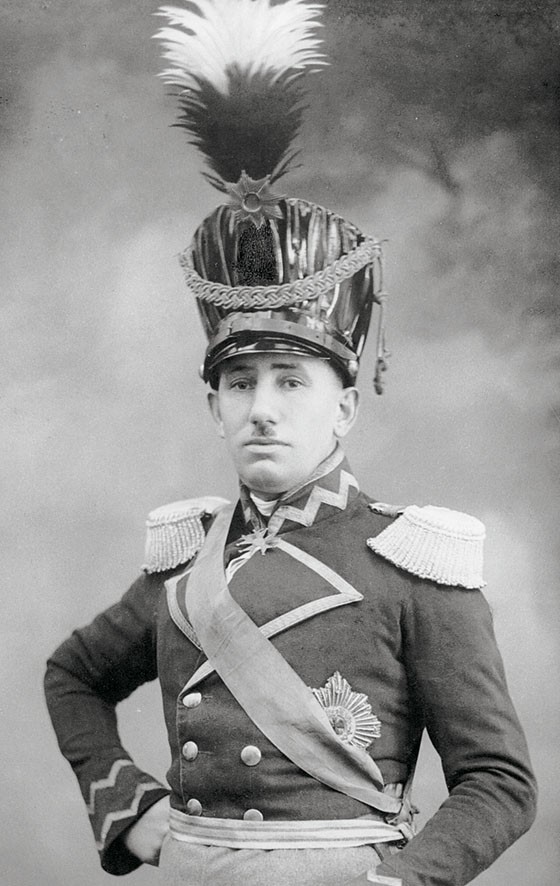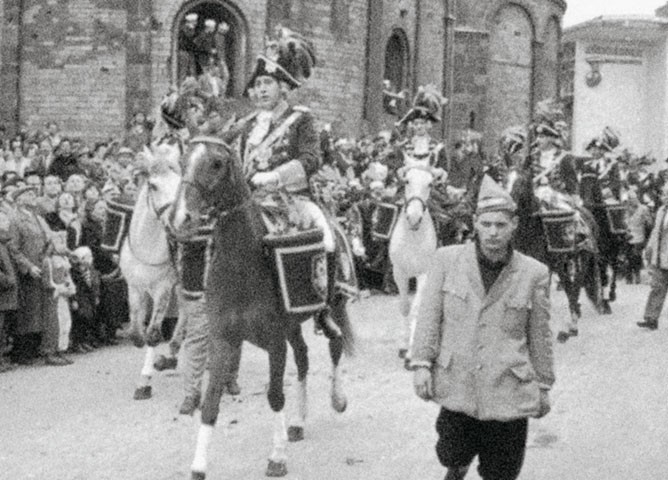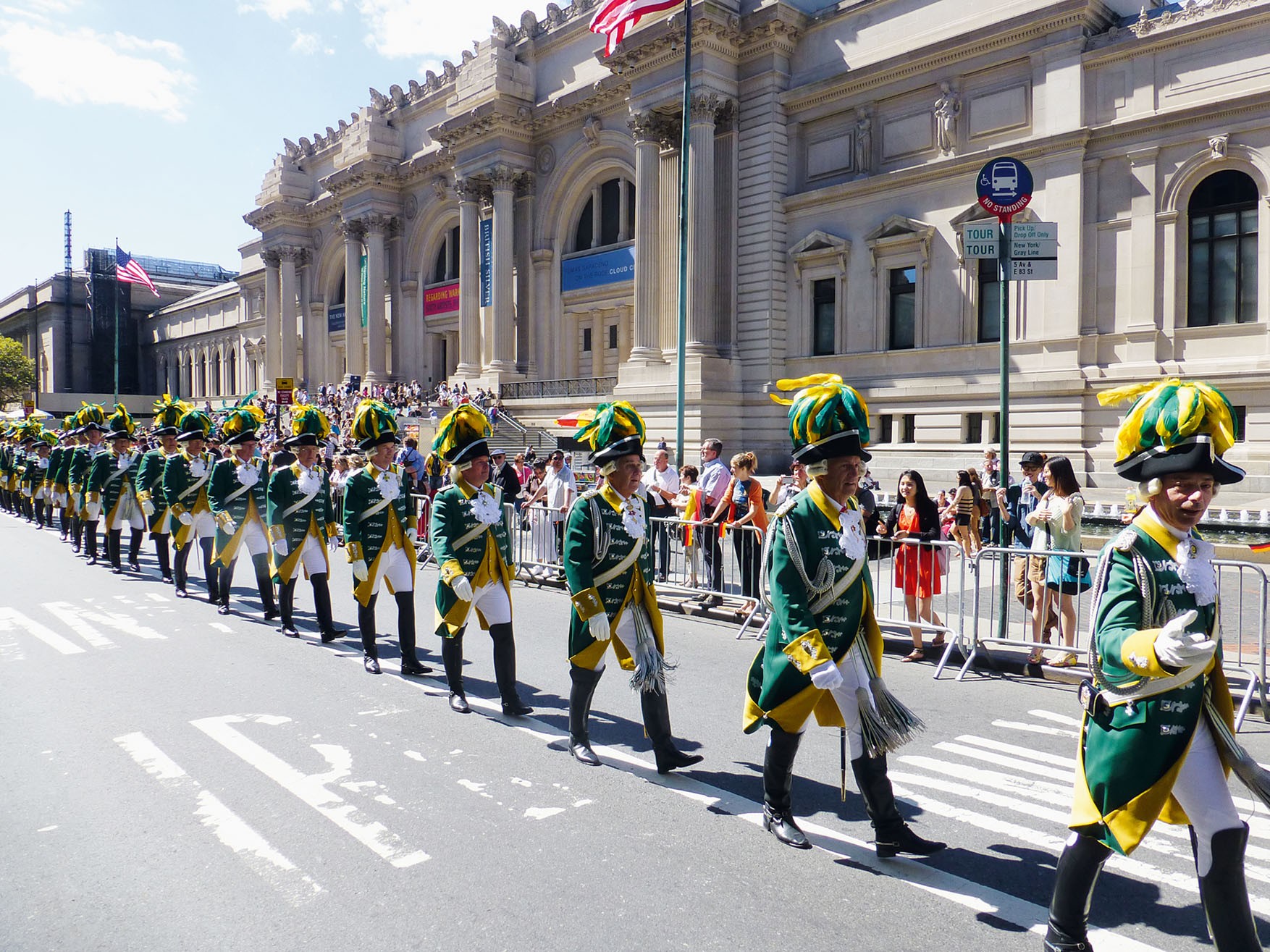The History
The history of the Cologne Carnival and the historical EhrenGarde
The history of the „EhrenGarde der Stadt Köln 1902 e. V.“ is closely linked to the history of Cologne and the Cologne Carnival.
The oldest recorded beginnings of the Carnival celebrations may go back far in history. From the Winter Solstice and Lupercalia it developed during medieval times into a religious festival just before the beginning of lent on Ash Wednesday. Guards of honour are a common institution in the history of Cologne.
The first recorded guard dates back to 1235 on the occasion of the ceremonial procession of Princess Isabella of England, later to become the wife of Emperor Friedrich II., in Cologne. Under napoleon occupation, a „Garde d’honneur de la ville de Cologne“ had been established, which served as a raw model for today’s EhrenGarde der Stadt Köln.
The ‚EhrenGarde der Stadt Köln 1902 e.V.‘ – from its founding to its 100-year anniversary in 2002 –
Today, when we look back over the 100-year history of our organisation, we see that one name is inseparably linked to the founding of the ‚EhrenGarde der Stadt Köln 1902 e.V.‘. Heinrich ‚Heinz‘ Stupp (1875-1955) was the founder and the first commander of the EhrenGarde. His likeness can be seen on the cover of this book.
 |
Growing up as the son of a theatre owner, Stupp caught the Carnival bug during the many years that his father organised activities for the Carnival procession. But this was not his only source of inspiration. As so often in life, in the case of Heinz Stupp, a chance happening provided the inspiration for the founding of the EhrenGarde. As a world traveller, he arrived in New York at the end of a voyage in 1896 and met the president of the society of ‚Närrische Rheinländer‘ (Carnival crazy Rhinelanders) among a group of German Americans. When he left, Stupp was asked to pass on a greeting to the former president of the Festival Committee, August Wilke. After returning to Cologne, he often met August Wilke. At one of these meetings, Wilke suggested to our founder the idea of including in the Carnival procession a new mounted group, with a historical connection to the city. From this point onwards, during his search, Stupp concentrated on the connection to the main figures of Carnival: the Prince, the Farmer and the Maiden. The Prince, as the master of all the revellers in the city, already had a group assigned to him. So Stupp concentrated on the figures of the Cologne Farmer, as a symbol of Cologne’s ability to defend itself and the Cologne Maiden, as a symbol of the City of Cologne. Stupp joined the ‚Stadtkölnische Ordnungstruppe‘ (Cologne City Order Troop) mentioned at the beginning and named the new group the ‚Schutzgarde des Kölner Bauern und Jungfrau 1800‘ (Protective Guard of the Cologne Farmer and Maiden 1800). Heinz Stupp chose yellow and green as the colours when the group was founded. Midway through 1900, Stupp changed the name. At the founding meeting on 15.11.1900, the general staff finally decided on the name of ‚EhrenGarde der Stadt Köln‘ (Guard of Honour of the City of Cologne).
Initially, the EhrenGarde was not permitted to take the sought after position in front of the Farmer and the Maiden in the Carnival procession. It’s thanks to his youthful enthusiasm and belief in the idea that Stupp and his followers were able to win through against the stubborn principle riders. Although the Festival Committee of 1902 did not allow the new mounted corps to take position in front of the Farmer and the Maiden, the subversive Stupp, with the then Prince’s courtiers, particularly the Farmer and the Maiden, succeeded in hatching a daring coup. It was agreed to give the mounted group the chance of slipping into a favourable position in the Carnival procession by faking a breakdown. With a cry of „Rubbedidupp“, the group won its place in the Carnival procession and has defended it to this day. The battle cry of the EhrenGarde „Rubbedidupp“ still serves as a reminder of this daring coup. This was a display of the original Cologne Carnival spirit. From this point on, the motto of the EhrenGarde has been: Dem Bauer zur Wehr, der Jungfrau zur Ehr! (For the Farmer’s defence and the Maiden’s honour!)
The First World War put an abrupt stop to the development of the Ehren-Garde and, during the period between the World Wars, a high degree of commitment was required to set up the EhrenGarde again. It was not until 1925 that the EhrenGarde was included in the umbrella organisation of all the Cologne Carnival associations, the Festkomitee Kölner Karnival (Cologne Carnival Festival Committee). Since there was no procession in either 1925 or 1926, the decision was taken to initiate public events in addition to intensifying the life of the corps, in order to reinforce its social status.
The Carnival procession was first reinstated on the Silver Anniversary in 1927, which became a joyful procession for the green-yellow corps. Within a short time, the EhrenGarde was flourishing again; lively membership and sold-out events brought the society back to life. The new heyday was demonstrated by the 50 riders in the Carnival procession of 1938. The outbreak of the 2nd World War again brought about the complete collapse of the organisation’s structures.
It was not until 1947 that the first proper attempts were made to bring the corps back to life, despite the general ban on meetings and events enforced by the allied city commander. The big change came in the year of 1949. At the beginning of the year, in addition to the 65 active members, there were 152 inactive and 62 honourable members of the green-yellow mounted corps. Since 1949, the EhrenGarde has been organising a Carnival event for elderly people in Cologne old peoples‘ homes, in this way highlighting its sense of social responsibility.
 |
The EhrenGarde has consistently worked at being at the forefront of the Cologne Carnival societies and today belongs to the groups known as the traditional corps. These include a handful of uniformed groups that, due to their size and above all their age, enjoy a special status and position in the Cologne Carnival. It considers itself an important grouping in the social life of Cologne and feels a special connection to its citizens. A visible sign of this connection is not only the participation in the Cologne Carnival procession with approx. 75 riders and numerous valuable coaches but also the acquisition of the most powerful and most important city gate of Cologne, the Hahnentor. Since 1989, this has served as an assembly point for internal meetings but can also be rented out for family parties. In addition to the exhibition room, it houses a museum that shows the past and present history of the EhrenGarde.
The EhrenGarde has travelled abroad on many occasions as an ambassador of Cologne and Germany. London, Paris, Lisbon, Amsterdam, Seoul and Taejon in South Korea, Hong Kong, Bangkok, Madrid, New York and Rome are just some of the places that the EhrenGarde has visited on its many foreign trips. In 1992, on the occasion of its 90-year anniversary. the society was awarded a special honour by being officially received by the then Federal President, Richard von Weizsäcker, in Bonn.
Thanks to the ‚Zweite Deutsche Fernsehen‘ (second German TV channel) broadcasting a Carnival event for several years, the EhrenGarde has become well-known far beyond the borders of Cologne. Today, the EhrenGarde of the City of Cologne presents itself in many diverse forms. The same as a hundred years ago, the core of the society is formed by the ‚Active Corps‘ with its cavalry and stage presentations during the session, in and around Cologne. The monthly calls to the corps are just as much a part of the life of the corps as the family excursions, the men’s excursions and the manoeuvres. The Active Corps is strongly supported by both the Senate and the Corps à la Suite. Both groupings support the Active Corps and have become an established part of the social life of Cologne. The fourth element comprises the inactive members who support the EhrenGarde, but do not have to meet the obligations of the active members.
Throughout its history, the EhrenGarde has time and again shown itself to be a pioneer in many respects and has led by example in its thirst for action. In view of this background, the EhrenGarde will organise many internal and official events for its anniversary year, with particular emphasis on the participation of the population of Cologne. One of the highpoints of the celebrations will be in the autumn of 2002 with the unveiling of a window for Cologne cathedral donated by the EhrenGarde and its members.
The publication of the anniversary book (100 years EhrenGarde) takes place at the centenary celebrations of the “EhrenGarde der Stadt Köln 1902 e.V”. with a detailed reporting of the history of the “EhrenGarde”, contemporary witnesses and all much valuable information data. This work, which has been made and researched meticulously with great loving care for details, is unparalleled, according to the estimation of the representative director of the city museum of Cologne, Dr. Michael Euler-Schmidt. In 2005 Frank Remagen was elected as new president and also new board. 2008 was a year full of events. The “EhrenGarde” presented first a nostalgia session at the “Kölner Flora”, which was right away a great success, and also the first opera ball of Cologne was a highlight still missed by the city of Cologne before. The “EhrenGarde” celebrated with the “Hahnentorburgfest” in August, by splendid summer weather, the successful end of the renovation works in the inner and outer area of the “Hahnentorburg”.
2009 started furiously for the “EhrenGarde”. Three “EhrenGarden members, „Prinz“ Hans-Georg I. (Hans-Georg Haumann), „Bauer“, Bernd (Bernd Tschirschnitz) and the „Jungfrau“ Johanna (Hans-Joachim Jennes) take on the Carnival scepter with the proclamation in Cologne. Our three regents filled with enthusiasm the audience in the ballrooms of Cologne, with much swing, charm and sovereignty, supported by the whole “EhrenGarde-Family”.
The session 2012/2013 was the year of our Carnival 111th anniversary. In view of the occasion we participated in the “Steuben Parade” in New York with 100 comrades and our regimental band. We had five unforgettable days in the multi-million-metropolis. In addition to our several sessions in 2013, on the occasion we presented two new dances and invited all nine traditional corps of the Cologne carnival on 11.01.2013 for a common celebration with a stage program at the „Hahnentorburg”.After 8 successful years as president, Frank Remagen resigned from office and Heinz Berenbrok was elected president of the „EhrenGarde“ in May 2013.
 |
In 2014 we presented a new so called „dance of the management“ with the theme „De 5 Johreszigge“ (the 5 seasons of the year including carnival). Heinz Berenbrok withdraw from his post as president in March 2016. Hans-Georg Haumann was elected new president in April 2016. From 15.09.2016 to 21.09.2016, the „EhrenGarde“, with more than 100 comrades, went to the great maneuvers in the eternal city of Rom. In uniforms and with regimental band, the „EhrenGarde“ marched through the capital of Italy and inspired the Romans. After three Years, in the session 2017 we presented a new „dance of the management“ with the theme „Bütz mich“ („Kiss me“). With the event „Knatsch Verdötsch“, the „EhrenGarde“ offers a new format for young people and their parents since the session 2017. Due to the worlwide corona pabdemic, no carnival events can be helde in this session. There will also be no „Rosenmontag“ procession, which was last canceled in 1991 because of the Gulf War.
Let us hope that the pandemic can be overcome in the session 2022 and that it will again be possible for us to celebrate the Cologne Carnival without blessing.
